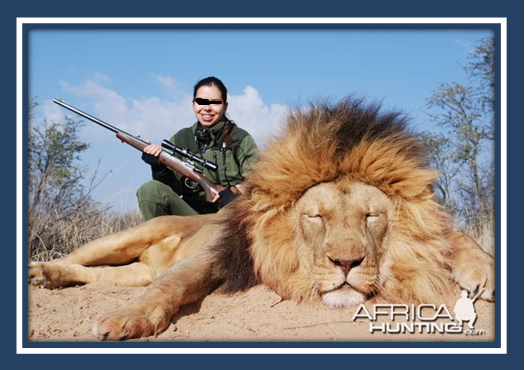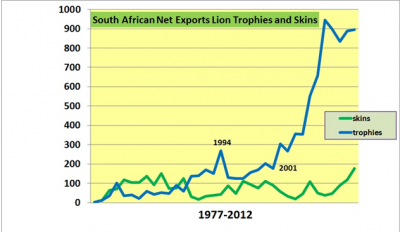News
Latest Lion Aid News
Even while trophy hunting organizations condemned canned lion hunts, the industry flourished
Wednesday 30th April 2014
|
The only limits seem the numbers bred and hunter recruits In the last few months, some interesting developments have occurred within the usually closed ranks of trophy hunters – two people with some standing in hunting circles have openly condemned canned lion trophy hunting. On January 7th this year Peter Flack, an influential hunting blogger, put an article on his website highly critical of both the practice and the about-face made by the Professional Hunter’s Association of South Africa (PHASA) on canned hunting. A PHASA Policy Statement in 1999 declared:
This likely followed from the fallout caused by the Cook Report expose of canned hunting in 1998. In 2006, bemoaning that PHASA members were still engaging in canned lion hunts, the organization issued a stern directive - “… any member who may be involved in the shooting of captive bred lions is requested to refrain from such activities or resign his/her membership of PHASA”. Stewart Dorrington, PHASA president 2005-2007 stated that “… PHASA has taken a very strong stand against the hunting of captive bred lions and we reject the hunting of any captive bred large predator under any conditions … We don’t want canned lions! It discredits hunting and it serves no conservation purpose!” Such lofty statements, however, were not backed up by actions – and in any case, PHASA is only one of several professional hunters’ associations in South Africa. And late last year PHASA aligned itself completely with the South African Predator Breeders Association to remove all objections from canned hunting – except that the client must be told that it is a captive bred animal in his/her telescopic sights. Peter Flack accused PHASA of selling out to the “money-making machine of canned lion shooting” and invoking “political support for this position by some of the conservation/environmental departments in South Africa’s nine provinces”. Flack goes on to say that canned hunting will not reduce hunting pressure on wild lions, has no conservation value, and that all the money earned simply ends up in the pockets of the lion breeder and the professional hunter. In another criticism of canned lion hunting, Ronnie Rowland, past President of PHASA had the following to say about the practice about a month ago: “Captive-bred lion shooting … transgresses the boundaries of fair chase hunting, endangers the essence of hunting and at the same time allows the erosion of our moral foundations. Has anyone realized that the acceptance of captive bred lion shooting also requires a change in this Code of Conduct since fair chase hunting is in total contradiction with the acceptance of captive bred lion shooting. [I will] have no choice but to resign as an honorary life member should the principle of fair chase hunting be disregarded in favor of the lion debacle and there are many like-minded members who will also be put before this choice. Once we allow material gain to supersede moral values, our world in general and hunting in particular is doomed. Prudent decisions alone, e.g. captive bred lion execution and line breeding of mutants, will kill hunting! The breeding of lions in captivity [for hunting] … has no moral base, no conscience and is purely based on materialistic considerations”. Neither Rowland nor Flack mention much about the history of canned lion hunting in South Africa, which is likely to have been going on for some time. CITES export records date back to about 1977, and indicate that South Africa has always been exporting lion hunting trophies far in excess of what would have been available from wild populations. Some of the earliest known lion breeding operations, like Sandhurst Safaris, likely began operating lion hunts in the 1980s.
The graph also shows that despite any “condemnation” by PHASA in 1999 and 2006, canned lion hunting remained well established and in fact flourished. Canned lion hunting clients are required to be accompanied by a professional hunter, thus ensuring their income. Moral objections seem to have little traction when it comes to the lure of easy money. What is also abundantly clear from the graph is how completely ineffectual any efforts to curb the practice of canned hunting have been in the past. The only limits imposed (during the past five years) seem to have come from the number of captive lions in the breeding pool and perhaps the number of trophy hunters available to be recruited. As mentioned, PHASA has now done an about-face and has accepted canned lion hunting as an activity here to stay. “Purist” hunters bemoaning the slaughter of captive bred animals were simply outvoted, and the majority of South African politicians see nothing wrong with the practice. There is clearly much more work to be done to achieve progress. Picture credit:Africa Hunting If you have not already signed up to our mailing list, you can add your name here and keep up to date with our ongoing work and, most importantly, DONATE to support our work to conserve the remaining fragile lion populations. Thank you |
Posted by Chris Macsween at 12:26
No comments have been posted yet.
Add a new comment
Existing user
New user sign up




 The graph shows the trends in South Africa’s lion trophy exports – a slow increase from the 1980s through the 1990s and then an exponential rise after 2001. The big increase in 1994 indicates that the canned lion industry was well established by that date – breeders were selling off their stocks to hunters at cut prices at the time of political uncertainty about their continued operations after Mandela was elected President and the ANC came to power.
The graph shows the trends in South Africa’s lion trophy exports – a slow increase from the 1980s through the 1990s and then an exponential rise after 2001. The big increase in 1994 indicates that the canned lion industry was well established by that date – breeders were selling off their stocks to hunters at cut prices at the time of political uncertainty about their continued operations after Mandela was elected President and the ANC came to power.